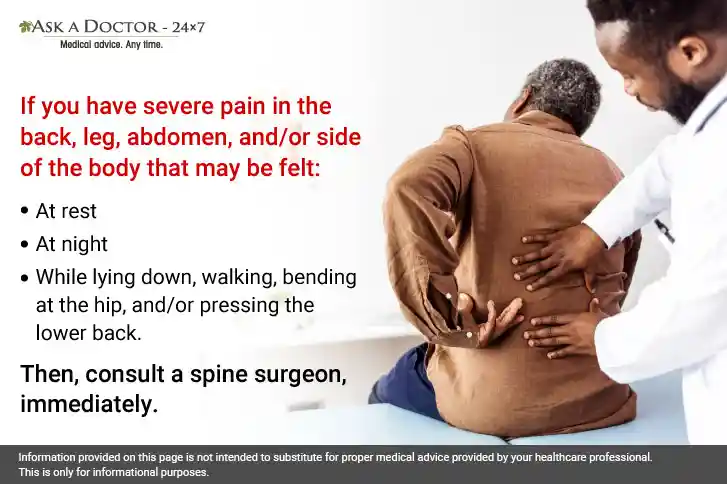How To Identify And Manage A Sciatica Pain
Do you feel a sudden pulsating pain in your lower back that radiates to your thigh and down to the ankle? Is it also accompanied by numbness or weakness in your leg that makes it difficult to walk? And, you’re wondering what’s going on? Your Sciatica Nerve may be the Culprit!
Our nerves conduct sensory responses in our bodies. Unfortunately, at times our nerves can get pinched/irritated due to various reasons like tight muscles, excessive strain, compression of some bony projections/foreign bodies, age-related spine changes, overweight, or sudden trauma/injury to name a few. The main nerve passing through the buttock is the Sciatic nerve and its various branches supply from the lower back to the hip to the ankle of each leg. In any circumstances, if our sciatica nerve gets inflamed or hurt, it can lead to a similar sensation to the one described above.
Read on to learn more about sciatica pain and ways to manage it…
What is Sciatica Pain?

Sciatica happens when irritation, inflammation, pinching, or compression affects one or more nerves that run down your lower back and into your legs. Usually, it is not a serious or dangerous condition, as most people with sciatica get better on their own with time and self-care treatments. However, in severe cases, a doctor may recommend surgery.
Identify the Symptoms of Sciatica Pain
Some of the common symptoms of sciatica include:
1. Recurring pain and discomfort: Pain is one of the most common and non-specific symptoms of any pinched nerve. However, the type of pain that may be recurring in this case, is deeper and sharper starting from the middle of the hips and moving down the ankles.
2. Tingling or pins and needle prick: Tingling-like sensation in the lower limb - Sciatica typically affects only one of the lower limbs, so do watch out for this. Pain can be particularly pronounced while sitting down or while standing after sitting for a long duration. One can also feel weakness in the lower limb along with the calf and the ankles.
3. Numbness: Numbness and tingling sensation with or without pain is another important symptom.
4. Foot drop: In advanced cases, there can also be a foot drop (inability to lift the front part of the foot) with or without loss of bowel-bladder control. This indicates severe nerve-muscle involvement. In this scenario, you need not delay anymore and consult a Neurosurgeon immediately for a thorough clinical evaluation.
6 Tips to Manage Sciatica or Pinched Nerve Pain
First and foremost, your doctor will prescribe to rest completely. A patient is expected to avoid any form of strenuous activities or heavy weightlifting.
Other than this, here are a few more tips that are proven to manage sciatica pain:
1. Apply some hot-cold compression. Begin with a cold compress as it is usually observed best for such injuries and pain. Put an ice pack or ice cubes wrapped in a towel for about 15-20 minutes at a time, gently over the affected area. Repeat this several times a day and observe how it stays. Then after about 72 hours, doctors usually suggest switching to heat. Use a heating pad similar to the ice pack for 15 to 20 minutes, several times a day.
2. Do some gentle back-stretching yoga moves. Seek help from a trained yoga specialist or a physiotherapist for optimum results.
3. Get some massage. Several studies have found massage therapy to be beneficial in managing sciatica pain and movement in your lower back. Regular massage improves blood flow in the nerves, which in turn helps our body to heal itself. To ease pinched nerve pain, make sure to get a massage from someone who specializes in back pain release and can also include some stretching strokes in your session.
4. Practice relaxation therapies like Meditation, Yoga, and Acupuncture as these are also proven to be effective in managing sciatica pain. But, make sure that these techniques are practiced only under the proper supervision of a physiotherapist or specialist.
5. Take some over-the-counter painkillers. NSAIDs such as Acetaminophen, Naproxen, and Ibuprofen are said to give much relief from sciatica pain. Make your to talk to a doctor for the right dose and to observe the progress.
6. Consult a doctor on time. Do not elongate practicing the home remedies if the pain persists or worsens. Consult a doctor and get yourself evaluated. Pertaining to your condition your doctor might suggest getting examined by a Specialist (Neurosurgeon/Spine surgeon) along with detailed investigations of the back and spine (MRI, nerve-muscle conduction studies) to look for the detailed analysis of the affected nerve, muscle, and/ surrounding spine/bony process.
The Neurosurgeon/ Spine surgeon may advise stronger painkillers with muscle relaxants and/or on-off steroid shots to relieve the pain and swelling involved. In severe cases, surgery to relieve the compression is performed. Surgery is not the first choice of treatment, so please don’t worry. However, it’s important to consult a specialist for a thorough evaluation.
When to See a Doctor for Sciatica Pain?

If sciatica pain does not get relieved with self-care techniques, rest, and/or exercise within two to three weeks and your symptoms are getting progressively worse over time then you must consult a medical professional.
Here are a few severe sciatica symptoms where it is advised to consult a spine surgeon for a better prognosis:
- Sudden weakness and severe pain down your leg
- Unexplained loss of bladder and/or bowel functions
- Unusual sensation of numbness or difficulty lifting your foot (foot drop)
- Substantial trouble in performing normal daily activities like walking
- Complete loss of balance and fine motor skills
- Sexual dysfunction
- Fever, chills, night sweats with cold feet or toes
- Changes in the color of the skin, hair, and muscle mass in the hands and feet
- Itchiness in the painful regions of the leg
- Infection in the leg that does not heal
Besides the above-mentioned symptoms, you must see a Specialist if your sciatica pain has developed suddenly as a result of a direct injury to the back.
To Summarize…
A pinched nerve in your buttocks or sciatica can be treated at home with hot-cold compression, over-the-counter pain killers along physiotherapy. However, symptoms like a foot drop, muscle weakness of the leg/feet, and bowel-bladder incontinence indicate severe damage and urgent medical attention is needed. Always ask a doctor in case of any doubts.
Symptoms of the pinched nerve are various and often non-specific, so don’t delay in case of persistent pain and get yourself checked up by the Neurosurgeon/Spine surgeon. Surgery is not the first choice of treatment, however, in severe cases, it should not be delayed.
At Ask A Doctor 24x7, we’ve dedicated Neurosurgeons as well as Spine Surgeons available 24x7 at your service. You can ask a question, chat, or choose to make an audio or video call and get personalized answers to all your medical inquiries in minutes.
So, if you have any further queries feel free to contact online doctors at Ask A Doctor 24x7 for any kind of medical assistance.
Recently Answered Questions Related to Sciatica Pain
- Does Sciatica And PCOS Have Any Connection Together?
- What Causes Episodes Of Sudden Weakness In Legs?
- Could Sciatica Cause Delay In Periods?
- Does Tart Cherry Juice Help Cure Sciatica?
- How To Treat Sciatica From A Bulged Disc In the Back?
- Suggest Safe Dosage For Magnesium Supplements To Treat Thigh Muscle Cramps
- Suggest Treatment For Sciatica Pain Post An Intercourse
- Does Acupuncture Treatment Help To Get Rid Of Sciatic Pain?
- Can The Sciatic Nerve Be Deadened Through Injections Without Causing Walking Problems?
- Swelling In Back Above Inflamed Sciatica. X-ray Shows Narrowing At the Base Of the Spine And Stenosis. Suggest Some Treatment.
Information provided on this page is not intended to substitute for proper medical advice provided by your healthcare professional. This is only for informational purposes.
Ask a Specialist
Recent Questions


